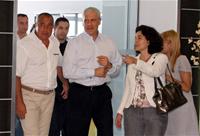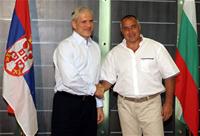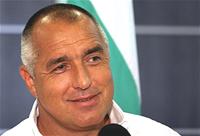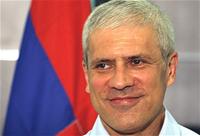Nuclear power stations are being counted in the autumn
Dessislava Dimitrova, August 11, 2010
 When reporting what has been done in the first year of the mandate of the Minister of Energy of Bulgaria, Traycho Traykov "unwillingly" omitted the plans for the construction of a second nuclear power plant "Belene" from the agenda of the Ministry. Later he explained that he would fine with 20 levs (10 euro) his assistants who were to blame for the omission. And then he concluded in one sentence that "in a year "Belene" would either have developed or would have been closed as an issue".
When reporting what has been done in the first year of the mandate of the Minister of Energy of Bulgaria, Traycho Traykov "unwillingly" omitted the plans for the construction of a second nuclear power plant "Belene" from the agenda of the Ministry. Later he explained that he would fine with 20 levs (10 euro) his assistants who were to blame for the omission. And then he concluded in one sentence that "in a year "Belene" would either have developed or would have been closed as an issue".
After his summit with the Serbian President Boris Tadich several days later (July 6 in Evxinograd) Prime Minister Boyko Borissov, without commenting on the future of the project, said that Serbia was ready to take part in the construction of Belene, but that the country would have to wait for Bulgaria to invite it because, firstly, we were to calculate how much the entire project would cost and who would replace RWE, which withdrew last summer. And the price of "Belene", as it is well known, is as unclear as the future of the project itself. The project has no luck so far because it is being considered for 20 years now. Its planned capacity is around 2,000 MW and the costs of the investment, in th meantime, increased from 4 to 6-7 bn euro, as estimated today.
According to Traykov, Serbia has shown interest in acquiring around 1% of the  future plant. According to his Serbian counterpart, Petar Shkundrich, however, his country had already got an offer for a 5% share in "Belene", which will cost Serbia between 300 and 350 mn euro. Shkundrich himself supports the project, because he says that it will improve Serbia's energy balance (currently there is a moratorium on power plants construction), by securing cheap and clean energy.
future plant. According to his Serbian counterpart, Petar Shkundrich, however, his country had already got an offer for a 5% share in "Belene", which will cost Serbia between 300 and 350 mn euro. Shkundrich himself supports the project, because he says that it will improve Serbia's energy balance (currently there is a moratorium on power plants construction), by securing cheap and clean energy.
"We are ready to train specialists who will in the future realise such projects in Serbia", Shkundrich said, quoted by the Serbian daily Novosti. "The electricity from nuclear power stations is the clearest and the cheapest and thus we will increase our energy balance. With additional quantities from "Belene" and the construction of several thermo-electrical plants, Serbia will undoubtedly become a leader in production and sales of electricity in South-Eastern Europe".
Quoting an anonymous source from the government, Novosti writes that by the end of September or the beginning of October the Serbian government would decide on its participation of the construction of "Belene". According to the same source, currently dominant are the yes-votes but an official offer from Bulgaria should be awaited on what share Serbia would take and how much it would cost.
In spring, during his visit to Shanghai, Shkundrich offered China a partnership in the construction of "Belene", Novosti recalled, adding that still there was no official response. The Ministry of Energy had explained for the newspaper that there were initial consultations with Chinese companies, but before any negotiations could start a decision of the government is needed.
 The logical question then is how can the government take a decision about Chinese participation, since all major energy projects in Serbia have been officially subdued to Russia during the mandate of Shkundrich's predecessor and now a minister of religion Radomyr Naumov.
The logical question then is how can the government take a decision about Chinese participation, since all major energy projects in Serbia have been officially subdued to Russia during the mandate of Shkundrich's predecessor and now a minister of religion Radomyr Naumov.
The colleagues from Novosti also recall this fact  but not in the context of Belene but of Borissov's statement that the South Stream pipeline, instead of entering Serbia through Zaychar, it should enter in Dimitrovgrad. The newspaper points out that on Gazprom's website the map of the project is still unchanged and as an entering point is shown Zaychar. But after all, the decision about the route of the pipeline will be taken by Gazprom and the Italian company ENI, which are major partners on South Stream.
but not in the context of Belene but of Borissov's statement that the South Stream pipeline, instead of entering Serbia through Zaychar, it should enter in Dimitrovgrad. The newspaper points out that on Gazprom's website the map of the project is still unchanged and as an entering point is shown Zaychar. But after all, the decision about the route of the pipeline will be taken by Gazprom and the Italian company ENI, which are major partners on South Stream.